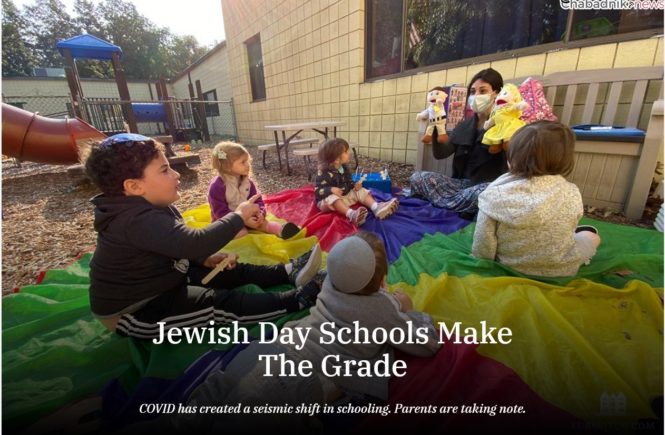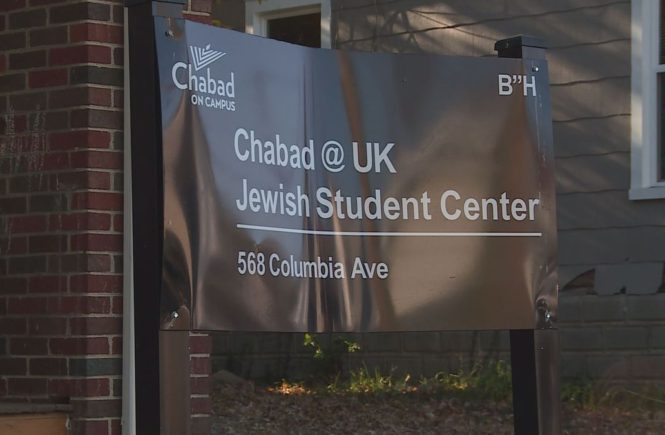SAN DIEGO — U.S. Attorney Robert S. Brewer Jr. experienced first-hand in San Diego the concerns shared by Jewish congregations around the country about anti-Semitism — a concern that prompted U.S. Attorney General William Barr to send a directive to U.S. Attorneys throughout the United States to arrange meetings with Jewish community leaders. At a kosher lunch meeting on Wednesday sponsored by the Anti-Defamation League, rabbi after rabbi — ranging from Reform to Chassidic–expressed their worries about the safety of their congregants at a time when there has been an increase in anti-Semitic hate crimes.
Rabbi Yeruchem Eilfort of Chabad of La Costa asked about the safety of people who are easily recognizable as Jews by their dress and their beards and payis. Rabbi Chalom Boudjnah of Chabad of San Diego State University told Brewer that some students are afraid to go to synagogue, especially his which is easily recognizable by the large menorah on its front lawn. Rabbi Moishe Leider of Chabad of University City said over the years Molotov cocktails have been thrown at his building and swastikas have been painted, resulting in his synagogue having to become more and more like a fortress. He wondered how congregations can assure people that they are both welcoming and secure. Rabbi Joseph Fradkin of the Chabad Hebrew Academy asked whether a law is necessary to restrict the naming of domestic terrorists, such as the one who opened fire last April 27 on Chabad of Poway, killing congregant Lori Gilbert-Kaye and wounding three other people including Rabbi Yisroel Goldstein.
To these questions, Brewer answered that the federal government is aware of the situation, is on the side of beleaguered religious communities, and in San Diego has a task force to investigate people who by their threats or actions seem to pose a danger to the community. He joined Tammy Gillies, regional director of the Anti-Defamation League, in urging people who see something suspicious, to say something. In the case of the so-called “Lone Wolf” shooters, who are not on law enforcement’s radar until they carry out their attacks, Brewer said there are signs to watch out for, including expressions of hate on the Internet, changes in that person’s behavior, including self-isolation, and the stockpiling of weapons.
Rabbi Devorah Marcus of the Reform Temple Emanu-El said she was worried about the sale of “ghost guns” made from assembly kits that will be sold on the Del Mar Fairgrounds at the Crossroads of the West Gun Show on March 14-15. Brewer said that he too was concerned about ghost guns, and said there would be numerous representatives of law enforcement monitoring what occurs there. As for people obtaining guns who threaten others, or themselves, he said, the Federal Bureau of Investigation works closely with San Diego City Attorney Mara Elliott to obtain restraining orders from the courts to take guns from such people’s hands. In the last 2 1/2 years, approximately 300 guns were confiscated on this basis, Brewer said.
The U.S. Attorney introduced Assistant U.S. Attorney Christopher P. Tenorio who heads up his office’s anti-hate crimes task force, recommending that anyone who is experiencing acts of anti-Semitism to advise his office via this email or via his office phone (619) 546-8413. Brewer also volunteered to speak to any congregation that would like to hear his thoughts about the partnership between law enforcement and the Jewish community.
Rabbi Yonah Fradkin, regional director of the Chabads throughout San Diego County, and Rabbi Scott Meltzer of the Conservative Ohr Shalom Synagogue, both invoked the story of just-celebrated Purim to draw a comparison between the dangerous situation for Jews that was posed in ancient Persia in the time of Queen Esther, and Jews of the current day.
Meltzer said the Megillah includes passages in which Queen Esther initially was urged to “hide who she was” so she wouldn’t be known as a Jew. Fradkin said that Queen Esther later was urged by Mordecai to “tell the king” about the plight of the Jews so that he could rescue them. Similarly, Fradkin said, the U.S. Attorney represents the sovereign that is the government of the United States.
*Gary Weitzman, the veterinarian who is president and CEO of the San Diego Humane Society, says he often is asked “Can I catch the virus from my pet or vice versa?” and he responds that both the Center for Disease Control and Prevention and the World Health Organization have issued advisories saying there is no evidence that companion animals can spread the virus. In case a household member is required to be quarantined as a result of the virus, Weitzman urges pet owners to “put together your plan for you and your pets,” taking into consideration what provisions you would need, and should you be unable to take care of your pet, making arrangements for the pet’s care elsewhere.
*San Diego State University has announced the cancellation of the March 26 event at which Yale Strom, in his capacity as artist in residence of San Diego State University’s Jewish Studies Program, was to premiere Sacred Text, an original score and ballet set to the Song of Songs, and featuring six dancers along with Luay Yousif, an Iraqi violinist and vocalist whose quartet was to play sacred music from Iraq.
*In consultation with the White House, The Republican Jewish Coalition has cancelled this weekend’s conference in Las Vegas, at which President Donald Trump was to have been one of the speakers. “We will look for dates in the near future when we can reschedule and when the current health crisis allows,” an RJC spokesperson said.
*Temple Emanu-El has advised its congregants: “When you come to the temple, instead of shaking hands or hugging, offer elbow taps, smiles, enthusiastic waving, and for the very coordinated, a friendly foot tap.”
*The San Diego Unified School District has decided not to close any schools of yet, but has given Superintendent Cindy Marten emergency power to do so should the need arise.


